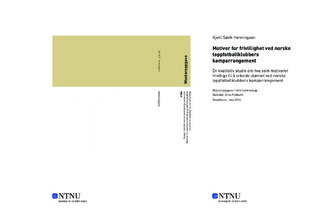| dc.description.abstract | The purpose of this master thesis is to exam what motivates volunteers working at
Norwegian elite football clubs home matches. What makes them work every other weekend
without payment? To examine this, the study have completed 12 qualitative semi-structured
in-depth interviews with volunteers from 3 different Norwegian elite football clubs. These
interviews took place before the start of the 2016 football season.
All of this is seen in light of two different main directions existing within the field of
voluntary motivations at sport events. The first direction emphasizes social psychology to
explain the behavioural motives of individuals. The second one looks at overarching
structures and symbolic explanations in the perspective of social science.
The results of this study shows that the volunteers have had different paths into their
volunteer role at the football clubs. However, what they have in common is their love for the
club they work for. They see themselves as supporters. The love they feel for the clubs
motivates them to contribute.
The relationship between the clubs and their voluntary workers may be seen as a reciprocal
relationship. The volunteers give of their time to work for the clubs without any expectations
of monetary rewards, but in return they get tangible and untangible benefits. The tangible
benefits is seen as a positive good rather than something that motivates, but for the
majority of the volunteers it is important to get to see the matches while volunteering.
Intangible benefits like the opportunity to get close to the players and experience the club
and elite football from the inside is also highlighted.
The social aspects of their voluntary duties was highlighted as the biggest good recieved
from volunteering. It also became clear that they do not want to recieve salary for their
contribution to the clubs. This seems to be related to the willingness expressed by
volunteers to help the club they have a special connection to. If they recieved payment, they
would probably also get more commitments. Furthermore, working on a voluntary basis
gives you the opportunity to take some time off whenever wished for. This way of organizing
the voluntary activities makes it less of a problem to work every other weekend throughout
large parts of the year. | nb_NO |
